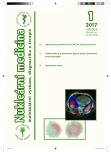Estimation of the accuracy of SUV measurement on SPECT/CT GE Discovery 670
Authors:
Pavel Karhan; Jaroslav Ptáček
Authors‘ workplace:
Oddělení lékařské fyziky a radiační ochrany, LF UP a FN Olomouc, ČR
Published in:
NuklMed 2017;6:3-7
Category:
Original Article
Overview
Introduction:
A cross-calibration of tomographic sensitivity of SPECT/CT camera GE Discovery 670 against the local dose calibrator BQMetr4 was done.
Material and methods:
The error of the calibration coefficient was estimated to be 5,1 % in laboratory conditions. The calibration was confirmed by a series of measurements with the Jaszczak phantom with no inside structures and with hot lesions in various geometries and for different corrections.
Results:
The highest precision in a non-symmetrically scattering and attenuating environment for objects of size 25 mm was achieved for the combination of scatter correction by acquisition in two energy windows and CT-based attenuation correction 7,2 (± 2,9stat ± 10,3sys) % for manual segmentation and 7,9 (± 1,5stat ± 8,2sys) % for segmentation based on searching the maximal average in a region of fixed size. For automated segmentation using thresholding it is desirable to implement the resolution recovery algorithm and the final precision reached 0,5 (± 0,9stat ± 7,9sys) %.
Conclusion:
The precision of SUV is determined by the precision of the cross-calibration. The systematic error of SUV is higher than the systematic error of the calibration due to imprecision of the dose calibrator and was estimated to 7,1 % at most for attenuation and scatter corrections for any segmentation method studied.
Key Words:
quantification of SPECT, SUV, measurement accuracy
Sources
1. Bailey DL, Willowson KP. Quantitative SPECT/CT: SPECT joins PET as a quantitative imaging modality. Eur J Nucl Med Mol Imaging 2014;41 Suppl 1:S17-25
2. Rosenthal MS, Cullom J, Hawkins W et al. Quantitative SPECT imaging: a review and recommendations by the Focus Committee of the Society of Nuclear Medicine Computer and Instrumentation Council. J Nucl Med 1195;36 : 1489-1513
3. Willowson K, Bailey DL, Baldock C. Quantitative SPECT reconstruction using CT-derived corrections. Phys Med Biol 2008;53 : 3099-3112
4. Buvat I. Quantification in emission tomography: Challenges, solutions, and performance. Nucl Instr Meth Phys Res A 2007;571 : 10–13
5. Frey EC, Humm JL, Ljungberg M. Accuracy and Precision of Radioactivity Quantification in Nuclear Medicine Images. Seminars in Nuclear Medicine 2012;42 : 208-218
6. Bailey DL, Willowson KP. An Evidence-Based Review of Quantitative SPECT Imaging and Potential Clinical Applications. J Nucl Med 2013; 54 : 83-89
7. Willowson K, Bailey DL, Schembri G et al. CT-based quantitative SPECT for the radionuclide 201Tl: experimental validation and a standardized uptake value for brain tumour patients. Cancer Imaging 2012;12 : 31–40
8. Karhan P, Ptáček J, Fiala P. Optimalizace rekonstrukčních parametrů pro SPECT a SPECT/CT. NuklMed 2015;4 : 66-72
9. DCMTK, OFFIS – Institute for Information Technology; verze 3.6.1 [online]. 2016. [cit. 2016-05-05]. Dostupné na: http://support.dcmtk.org/
10. Anděl J. Základy matematické statistiky – 3. vydání. Praha, Matfyzpress, 2011, 360 p
11. NEMA Standards Publication NU 1-2012: Performance Measurements of Gamma Cameras; National Electrical Manufacturers Association 2013, 60 p
Labels
Nuclear medicine Radiodiagnostics RadiotherapyArticle was published in
Nuclear Medicine

2017 Issue 1
Most read in this issue
- Radiopharmaceuticals for imaging gliomas using positron emission tomography
- Estimation of the accuracy of SUV measurement on SPECT/CT GE Discovery 670
- Nuclear medicine remains independent medical specialty – what next?
